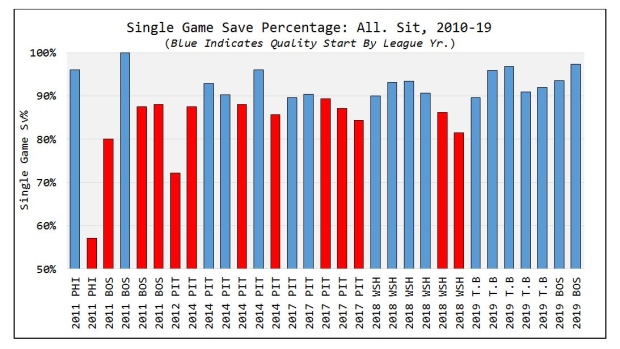May 2, 2019
Bobrovsky writing his postseason redemption story
Sergei Bobrovsky has long been considered one of the league’s premier goaltenders, but he has routinely been on the receiving end of harsh criticism after most of Columbus’ postseason flameouts. That narrative is changing quickly, writes Travis Yost.
By Travis Yost

The Columbus Blue Jackets are 10 wins away from a Stanley Cup, and no player has been more critical to their team success than goaltender Sergei Bobrovsky.
It is, in some ways, a funny redemption story. Bobrovsky has long been considered one of the league’s premier goaltenders, but he has routinely been on the receiving end of harsh criticism after most of Columbus’ postseason flameouts.
Some of that is understandable. Despite his consistent regular-season numbers, Bobrovsky’s playoff performance always paled in comparison. Perhaps no better example exists than Columbus’ first-round exit in 2016-17, where Bobrovsky – who had stopped 93.1 per cent of shots en route to the Vezina Trophy – had a miserable time against the Pittsburgh Penguins. Bobrovsky stopped just 88.2 per cent of shots, and his reputation as a playoff dud solidified.
The playoffs are all about micro-analyzing tiny samples of data and, unfortunately, that can take us down a dark path from time to time. It certainly did in the case of Bobrovsky. One of the league’s better goaltenders carried the reputation of a playoff choker on the basis of just 24 games.
Although there were moments in those games where Bobrovsky certainly looked out of sync, I would argue that you can find 24 bad games from any goaltender in the league. To that end, there’s quite the difference between a goaltender who hasn’t played well in the playoffs and a goaltender who can’t play well in the playoffs.
That brings us to 2018-19. You certainly couldn’t have given Columbus much of a chance this postseason if you believed those 24 games on Bobrovsky’s resume held any predictive power. Plus the road would be difficult, travelling through the likes of Tampa Bay and Boston. But Bobrovsky was instrumental in dispatching the Bolts in four games and has been just as important in driving the Blue Jackets to a 2-1 series lead in the second round.
If you look at Bobrovsky’s postseason performance since his initial appearance back in 2010-11, you can see why the reputation manifested. There were plenty of suboptimal starts, with few quality starts scattered in between. But the last couple of seasons have seen a resurgence in Bobrovsky’s playoff play – the type of numbers we would naturally have expected from standard regression for a goaltender of his calibre.
And although this year has been the pinnacle of Bobrovsky’s postseason play, it wasn’t as if he was overwhelmingly bad in last year’s first-round series against Washington. In fact, 11 of Bobrovsky’s last 13 starts have been at worst competitive and at best quality:

Do I think that certain athletes around the four major sports allow the pressure of postseason play to get to them, both mentally and physically? Absolutely. But a lot of time, I wonder if the idea of a player being hit with the reputation as a choke artist come playoff time is merely based off of small sample variance that will naturally rebound over time.
After all, how else can we explain Bobrovsky? For years, it was thought that teams could not win in the playoffs with him between the pipes. That narrative has been hurled out the window in a matter of a dozen or so games. You would think that we would have learned our lesson from guys like Marc-Andre Fleury – also long considered a playoff underperformer, until he wasn’t.
Perhaps the most fascinating part of all of this is the fact that Bobrovsky is almost certainly leaving Columbus this summer. The market, which is always reactionary and sensitive to playoff performance, was probably a bit cooler than it should have been for a 30-year-old who has stopped more rubber than all but six of his peers (names like Henrik Lundqvist, Pekka Rinne, and Carey Price) since entering the league.
Does the market materially change if Bobrovsky keeps carrying the Blue Jackets this postseason? I think so, and if that’s the case, we should probably rethink how we critically assess playoff performance.
Data via Natural Stat Trick


